Excerpt from a novel of speculative fiction imagining a post-imperialist future enabled by the success of ongoing liberation movements, with Gaza holding the frontline of resistance to Empire today. Featuring a technology that enables humans to transcend the confines of the body — as a social practice and a metaphysical possibility.
Those first days with you brimmed with a heady elation. You wandered freely with me, never scanning into ports, as though you had unfettered access to the entire hillside. You cruised boldly, as though embodied. But you weren’t.
The questions – of whether you were real or not, guide or channel, human projecting in from some faraway place or experiment conjured to walk the line between apparition and projection — were all dispelled by that sweeping feeling of acute awareness, intensified the closer I got to you.
We walked endlessly, you and I, paying faithful homage to these magnificent hills. I took you on all the paths I knew and many that I didn’t, through the overgrown brush of abandoned homes or along the river that rushed clear from the big mountain, past village hamlets where I’d pick up little snacks – roasted corn slathered with lime and salt, freshly popped lotus seed, juice cold-pressed from fragrant fruit – or across graveyards of bodies stratified by era or by faith. This land a repository of relics long preserved.
All the world’s an archive, as Iloo would say. Countless influences flowing in and out like the tides, tearing through the old and raising new truths. Even these trees weren’t indigenous – the slopes once razed for timber to build the colonizer’s railway, foreign seeds imported to occupy the very wilderness.
Iloo and I often deliberated the question of ownership in these hills: with so many ruling orders taking over the space in turns, reinventing both the population and the landscape, who got to define the history, whose history was it to define?
Walking with you I’d remember those debates. Except that you and I never spoke. I took solace in this – for I felt exhausted by, and suspicious of, the omnipresent outpouring of words.
And so I savored the silence in which we walked, the vastness of what could be intuited, the delicious suspense of unveiling what would soon, inevitably, be declared. Why rush? It’d be there waiting no matter how long we took to claim it.
Of course, there is never enough time. The storm of fate would always dwarf us, we would always be helpless against it. This undercurrent of doom to our virtual romance.
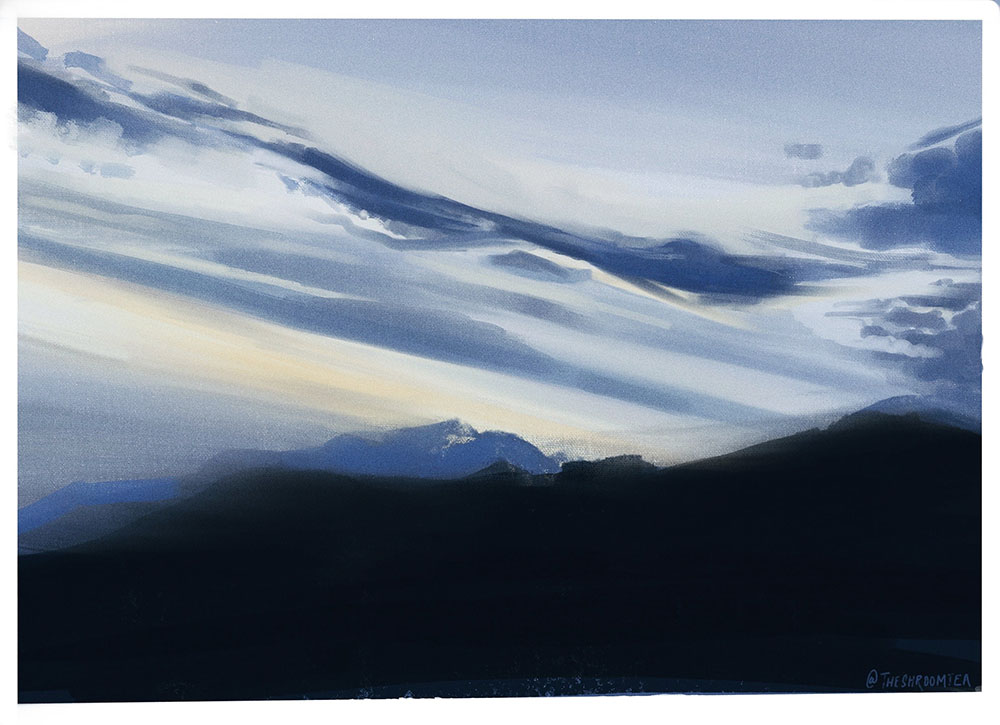
You were perpetually in motion, practicing your movement. A deliberate pantomime of vigorous physicality, an effort to describe the edges of your projected self.
I’d be in the kitchen making food you couldn’t eat and you’d be out spinning against the psychedelic flowers, the spectral mountains sketching the skies, or tumbling along the roof with acrobatic grace, the orange light piercing right through your ephemeral frame, or poised at the ledge of the lofted window to somersault down to the grainy oak floors.
The first time you spent the night we’d been home all day, our wanderings prohibited by another suffocating storm. The hours passed slowly, each of us absorbed in our separate cell bubbles, and as I climbed up to my lofted room I barely processed the fact that you’d stayed.
I lay on my back, you on the couch below, your cyan luminescence leaking all over my sheets. My eyes traced the beams above, reminiscent of a ship cabin, the tiny window high up in the wall like a nautical portal. Outside: electric lashes, fearsome thunder, a tempest I navigated on my little dream raft, your glow buoying me like a puddle of moonlight.
I wondered drowsily who you were and why you chose to stay projected here with me. Or if you were some kind of experimental entity, whether sleep ever overtook you, whether your body had a sense of time, whether input from the cell exhausted you as it did us ordinary mortals.
Slumber an extension of my generally intoxicated state, I submitted blissfully to the superhuman awareness that inundated me in waves.
The next morning, you were still there.
It was still pouring. The gloom that had previously oppressed me now presented an invitation. Fitting the entire room wall-to-wall, we rigged a colossal sphere and searched the world for inspiration.
We located a port in an ancient jungle, a lush wilderness filled with birds and beetles and a profusion of flora. I scanned my node for access while you simply alighted into the scene. The sun cut thin slices through the thick canopy above as we lay cradled in foliage, iridescent insects scuttling about, the silence between us amplifying the harmonious clamor of forest life.
When the room started to feel constrictive, I printed a cell mat to glide along the floor so that I could tread in place – you mirroring my motion on a whim. Together we forged through the dramatically transitioning hues of a spectacular canyon and watched the effects of the sunset from a seemingly impossible vantage point.
I murmured my appreciation for those who’d labored to display these planetary phenomena, the tremendous feat of outfitting such sites with activated vines that enabled not just a glimpse, but a whole-body immersion.
Over the remaining days of that week-long storm, the cell pad was my conveyor belt through a world of open ports, sustaining my step while you floated free. We examined galleries filled with curiosities in random urban centers, mingled with people loitering at cafes and in squares, sat in on music or performance or political lecture, enjoyed life as ambient strangers.
Submerging into the din of an open bar, I imagined how we might share libation if you were actually here, relishing in the rush of it, the magic it had of easing the mind, even as we projected into those faraway pubs. We never did drink together, but we danced. We danced like we were starved for it, till my movement became as unbound as yours.
After one such night of multidimensional adventure, I woke with the projected image of a cavernous warehouse silent and still around me, the light dribbling weakly through the sky roof above. I stretched and felt the pleasurable ache of my muscles. I looked for you, but you weren’t there.
Squinting, I confronted the glare of the morning and lumbered down the hill to your favorite spot. You hovered surreally over the fluttering swing, staring inertly out at nothing, your cyan body bright and strange against the cerulean sky.
‘You okay?’ I asked instinctively, sensing that you were not.
You nodded and straightened up as though the motion could conceal your gravity. But you were obviously unsettled. Even if we didn’t know each other well at all, I could feel the shift.
I took the swing next to yours and waited for the moment to pass.
‘It’s a lot,’ you said, after a while, the first words you’d ever said to me. ‘All this abundance, all this life, all this history… all rooted in this one earth. It’s almost… too much… you know?’
I didn’t know. But I didn’t ask. Sometimes we’re struck profoundly and personally, sometimes words are just approximations, and I didn’t want to demand anything more than you were willing to give.
I just sat there, shocked that you’d spoken. Shocked by your voice, deep and low and melodic, like the velveteen moss coating our waterlogged woods.
Its texture, its musicality, was all the evidence I needed to decide that you were far from a spirit or a specter invented from the cell. Out there, somewhere on this planet, you had a real life, friends who knew that voice, a community that had shaped it. And for some reason, you were choosing to project here, to spend all your days with me.
I wished I could gift you something monumental in return. Wished I could yank away the immense mantle of mist to present you with the greatest vision we had on offer: the HimAlaya, our dwelling of snow. Behold these prehistoric gods as they amble past our horizon! This evidence that once upon a time, our little subcontinent broke from its motherland and flung out into the roiling seas to collide against a mothering aunt, diversifying the story of our species forever, creating a brand-new chapter.
Conversation posed a new frontier that we edged into slowly, grasping for the things immediately around us. The monkeys, of course, the mountains, the stories of locals, the dogs. Until finally, I asked what you were doing here.
‘Following a blood link,’ you said, describing distant ancestors from these parts who were lured west to build the foundations of a newly colonized world. Impoverished by caste, coerced into servitude in another corrupted land, they drifted eventually north, to the site of your birth.
And so you told me the story of your people – ‘cutting it up in the belly of the beast’.
At the heart of that spectacularly sunken empire, the seat of terrorism, a corporate fraternity hacked humorlessly away at any spark of humanity, sacrificing the citizens of earth at the altar of capital, engineering and exporting demonic diplomacies, implementing every tool from surveillance technology to confinement by policy to cold-blooded murder to immobilize all effort at political organization for fear of being overthrown.
Your people – stolen and sold from plundered homelands, roaming rhizomes long uprooted, a diaspora of the damned – took the lead from brethren across the waters to build intelligence, to strategize resistance, to vanquish this evil in a coordinated coup.
In a multi-pronged approach, they worked to fortify local economies and safeguard essentials like shelter, food, healthcare and education, all while coalition building across community lines and in critical solidarity beyond your borders.
The system, riled to fury, targeted each enterprise with a vengeance, rationalizing brutality through law and order, business as usual. State violence advanced in concert with popular rebellion, the violence itself feeding the spirit of mutiny. After eons of proposing reform to rulers hell-bent on protecting empire, the people were ready to rush the citadel.
And so, steadily, ordinary citizens mobilized to be on guard, embracing militant action and committing to armed struggle. These were covert formations; like so many other revolutionary tactics, they were kept as discreet as possible. Like superheroes, you said, they had to be stealth or else they’d be wiped out. A mission of uprising by any means necessary.
The empire tried to keep its fortresses intact, to convince its closest subjects that everyone had to stick together or else everyone would fall. But a momentum had been churning now for generations, so easy to harness, to decisively topple the entire apparatus.
How incredible the development of our entwined movements, to push past a seemingly impenetrable consolidation of power and reclaim something as simple and inalienable as the right to live. How exhaustively the people mustered their force, like antibodies correcting a virus. A force of retaliation regardless of risk… because living in enslavement is to not live at all.

Empires unravel through their own contradictions, you said. Through their own negligence and vulgarity. The imperial stance exponentially enfeebled the further it stretches from common ground, from the sheer arrogance of attempting to stretch so far.
Yet how effective its manipulation, I said, for the people to self-sabotage in the name of an order that they knew was never going to benefit them.
Those are the contradictions that galvanize revolt, you said, propelling the citizen to smash the claw of false governance, the ruse of assurances – for security, for stability, for justice – as the empire narrows into the hands of fewer and fewer, a circus of debt.
Between ruler and subject a mutual contempt and fear. The colonizer suspended between smoke and mirrors, terrified of discovery, clinging to a throne built on stolen ground, stolen labor, as proof of its relevance. Terrorizing a people that can see through the illusion, that study it to understand how the game is rigged, that question why they’re the ones begging for a ‘seat at the table’ when the table never belonged to them, you said. It always belonged to us.
How thrilling it must have been, even in the midst of ruinous disaster, to be at that moment of bringing it all down. The meticulous process of gathering methodologies, from across tribes and from the ground up, into a simple and elegant blueprint, the scaffolding of a new society, that spread like an axiom through the cell.
You loved the story of the cell, the way it all began. A story of innovation and collaboration and defiance. An ambition for autonomy, a tool of dissent against empire that eventually facilitated its demise, providing an unregulated grid to disseminate knowledge and power, advancing the project of sovereignty, the mobilization of community that so threatened the ruling class.
It came from the youth, young people living on the outskirts of a vast and forgotten desert located halfway across the earth – between your home and mine. That place – which had functioned as the primary zone of conflict since the birth of this Empire that transmogrified and nearly annihilated humanity – remained war-torn for centuries until the final battle for sovereignty that gave way to a new world order.
Naturally, the most seditious weapon was conceived on this site.
Some kids working in a lab — flush with funding from the burgeoning empire of the east — started experimenting with a cactus gel substance to purify and store water. Water, that’s what it started with. That simple, invaluable resource on which all life depends.
They figured out how to encode this substance on a molecular level, to manage its capacity to store water, and then the energy of the sun, and then to produce these elements on command.
Far from that desert, across the broad waters, young people living within a vast and disremembered rainforest extended these attributes to an algae-like substance that could regrow itself when hacked apart.
They programmed it to send out tendrils and form organic connections between disparate points, creating a grid of vines that could tap the surrounding environment for water and solar power. An earth-based, renewable technology that solved for basic and crucial disparities.
When the frontline of the resistance exploded in a strategic operation to take down the empire, the kids in the desert lab worked quickly to encrypt this network with the type of coding needed to connect people across space. They brought in technicians to design its ability to project bubble-like spheres that emitted imagery and sound, along with an accessible user interface.
And so the cell emerged as a tool of war, helping to connect those in struggle without detection from imperial spies. Now comrades could eschew the existing grid to transmit critical communications, appropriating the lifeline so feverishly guarded by corporations and governments bent on controlling and manipulating the distribution of intelligence.
Without the cell, could the revolution have succeeded? One of those mystical questions of our times.
The next step was obvious. To lace the very DNA of the substance with the capacity to store information, all the information we’d ever gathered, all of our wisdom in an organic form. The grid we use today. The cell became a viable alternative to clunky computing machines. Ubiquitous, unshackled, generated from elements of nature.
Innovations continued after liberation – to fuel the substance with waste materials like plastics or methane, to harness heat for cooking and improve insulation, to distill nutrients from plants, to ‘print’ the substance and stretch it into membrane, to strengthen it like plexiglass.
Simple, complex experimentations ensued, to transform objects big and small: a brush that releases water and oils to revitalize hair follicles; a cell dome that grows into a shelter from a circle of vines on the ground; a greenhouse programmed to nourish seeds into food.
The cell spawned whole new possibilities for healing, connectivity, education, innovation… and self-reliance. Now people could eat without breaking their backs, enjoy leisure without measuring time, travel spontaneously by projecting into open ports without having to face the guardians of imaginary gates.
Why were you here? To learn about long ago ancestors, to figure out how to be? Was it helping you – to be here with me? What difference did it make – whether we know or not, about the bloodlines we once shared. I suppose for the way it calms the miseries that surface when we face the questions of belonging, not belonging.
All my life I’d grappled with this quest. Now here I thought you offered some resolution. You floated through the world as, I thought, did I. You embodied this equivocal state so completely, with your physicality and your politic. You studied the events of the past as a science rather than with sentimentality. I admired your equanimity, I wished to emulate it.
It’s not that you weren’t moved. For example, by the fact that humans are capable of such mutilation – to bomb, to starve, to strip of all dignity. A form of self-mutilation, you said, when you consider the theory that we’re all simply reflected embodiments of a singular force. And yet, in the name of god or clan or liberty, these humans are capable of annihilating all life.
And you were moved, too, by the unflagging resistance. The capacity of the spirit to transcend such desecration. The power of faith, for the people to unify and sacrifice their living bodies for the possibility of a future where other bodies might live free. To fight on empty stomachs, to train sticks and stones into the eye of that monstrous machinery, to score, to win. Astounding.
How to reconcile the notion of shared humanity with the architects of such sadism? Those who churned out machinery funded off the labor, off the lives and deaths of the subjugated masses, without a flicker of guilt or shame. Entrusting this machinery, lethal and demonic, to cackling schoolboys who shoot for sport, the children of Empire so innocent in their ways.
How many martyrs had this Empire produced, how many great warriors crucified onstage, egged on by audiences paying good money to fund that revolting theater of war?
How could such infirmity prevail, you couldn’t stop wondering, given the theory that all beings are ultimately aspects of a singular body, a quintessentially mystical production?
And I couldn’t stop wondering about you.
What was your project? To witness, to study, to mourn… to address some living abomination, some enduring stain on your tribe. To make sense of the grander catastrophe marking our species – of stolen bodies, stolen lands, stolen fates. Or was it simply, as it was for me, to figure out where you fit in.



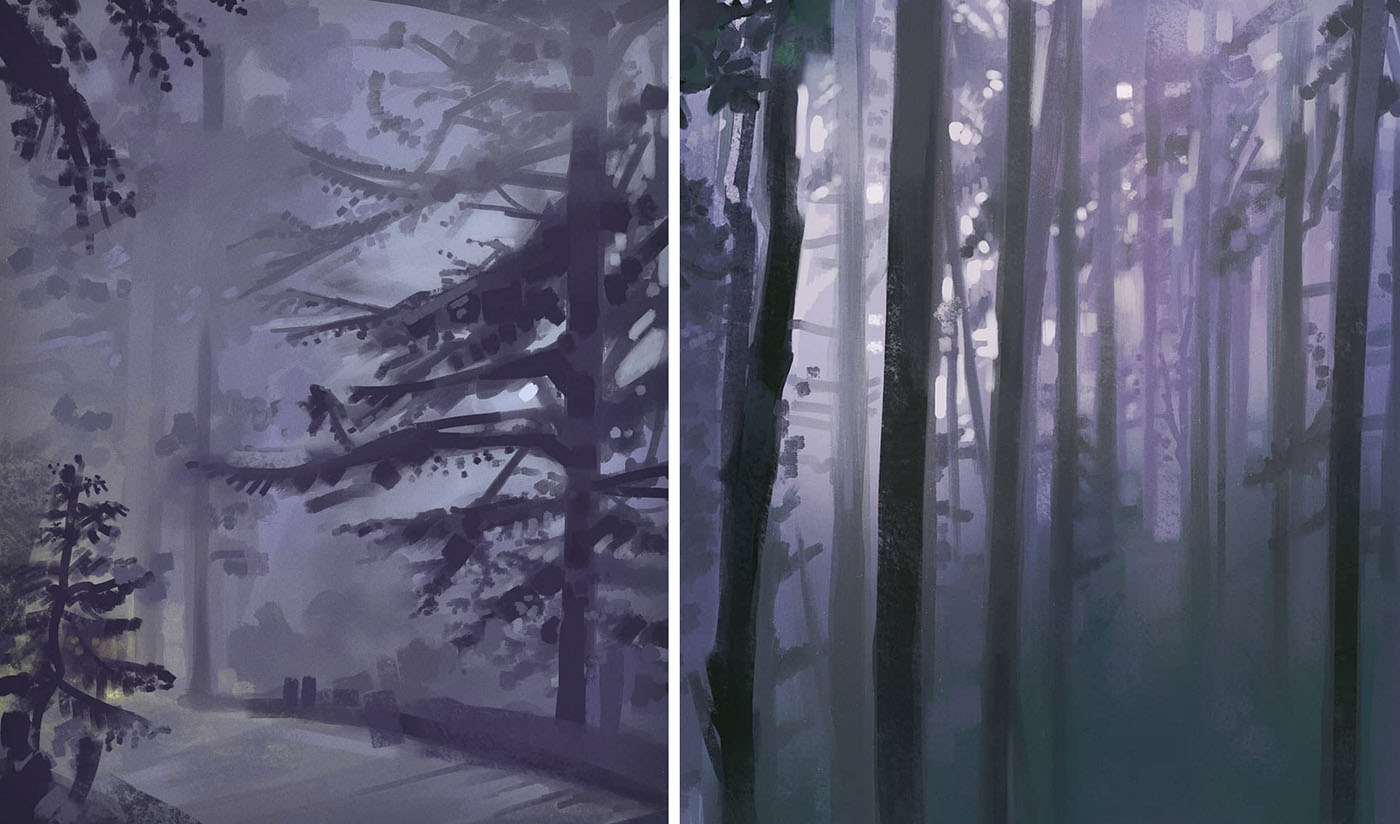


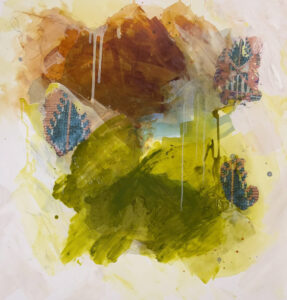
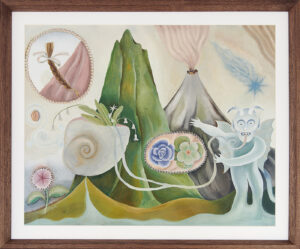










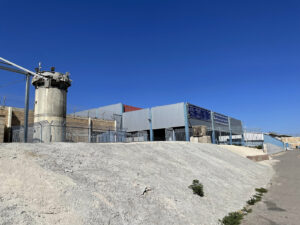


Pingback: Radhika Singh – “The Spirit of Mutiny” – MFA in Creative Writing & Literary Translation